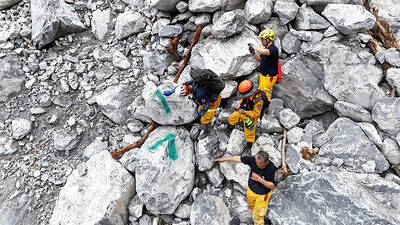A doctor has warned those who are working from home or under quarantine to maintain a healthy level of exercise, as those who are too sedentary are more at risk of having a stroke.
Those with a history of stroke or cardiovascular disease are 25 percent more likely to have a stroke if they do not exercise for extended periods, said Yeh Shou-cheng (葉守正), director of neurology at Cheng Ching Hospital’s Chung Kang Branch.
People who sit for more than six hours straight per day also have a 19 percent greater risk of premature death, compared with those who sit for less than three hours straight daily, he said.

Photo: CNA
When people sit for excessively long periods it disrupts blood flow in the legs, and can result in blood clots, he said.
“When you get up and move around after sitting for a while, the body breaks those clots into smaller ones that can cause a stroke when they reach the brain,” Yeh said.
Those at risk of stroke are at greater risk when they first wake up, as their temperatures are lower, and there is a clumping of platelets that occurs when people sleep, he said.
Steroid hormone production is also higher when a person is waking up, which causes an increase in blood pressure and heart rate, he said.
People who are 65 or older are advised to avoid crowded places until the COVID-19 pandemic has passed, as they are more at risk of dying if they contract the virus, he said, adding that other conditions such as high blood pressure and diabetes would exacerbate that risk.
For those on medication it is imperative to take it as prescribed, he said.
If a stroke does occur, rehabilitation is possible if the person is treated quickly, and the blood clot is dissolved, Yeh said, adding that 40 percent of stroke patients lead a normal life after leaving hospital.
However, exercise is an important part of preventing strokes, he said, adding that some exercises can be done at home such as stretching, resistance training and cardiovascular exercise.
For example, hip rotations, dancing and running on the spot are all exercises a person can do in their living room, he said.

Former president Ma Ying-jeou’s (馬英九) mention of Taiwan’s official name during a meeting with Chinese President Xi Jinping (習近平) on Wednesday was likely a deliberate political play, academics said. “As I see it, it was intentional,” National Chengchi University Graduate Institute of East Asian Studies professor Wang Hsin-hsien (王信賢) said of Ma’s initial use of the “Republic of China” (ROC) to refer to the wider concept of “the Chinese nation.” Ma quickly corrected himself, and his office later described his use of the two similar-sounding yet politically distinct terms as “purely a gaffe.” Given Ma was reading from a script, the supposed slipup

Former Czech Republic-based Taiwanese researcher Cheng Yu-chin (鄭宇欽) has been sentenced to seven years in prison on espionage-related charges, China’s Ministry of State Security announced yesterday. China said Cheng was a spy for Taiwan who “masqueraded as a professor” and that he was previously an assistant to former Cabinet secretary-general Cho Jung-tai (卓榮泰). President-elect William Lai (賴清德) on Wednesday last week announced Cho would be his premier when Lai is inaugurated next month. Today is China’s “National Security Education Day.” The Chinese ministry yesterday released a video online showing arrests over the past 10 years of people alleged to be

THE HAWAII FACTOR: While a 1965 opinion said an attack on Hawaii would not trigger Article 5, the text of the treaty suggests the state is covered, the report says NATO could be drawn into a conflict in the Taiwan Strait if Chinese forces attacked the US mainland or Hawaii, a NATO Defense College report published on Monday says. The report, written by James Lee, an assistant research fellow at Academia Sinica’s Institute of European and American Studies, states that under certain conditions a Taiwan contingency could trigger Article 5 of NATO, under which an attack against any member of the alliance is considered an attack against all members, necessitating a response. Article 6 of the North Atlantic Treaty specifies that an armed attack in the territory of any member in Europe,

The bodies of two individuals were recovered and three additional bodies were discovered on the Shakadang Trail (砂卡礑) in Taroko National Park, eight days after the devastating earthquake in Hualien County, search-and-rescue personnel said. The rescuers reported that they retrieved the bodies of a man and a girl, suspected to be the father and daughter from the Yu (游) family, 500m from the entrance of the trail on Wednesday. The rescue team added that despite the discovery of the two bodies on Friday last week, they had been unable to retrieve them until Wednesday due to the heavy equipment needed to lift